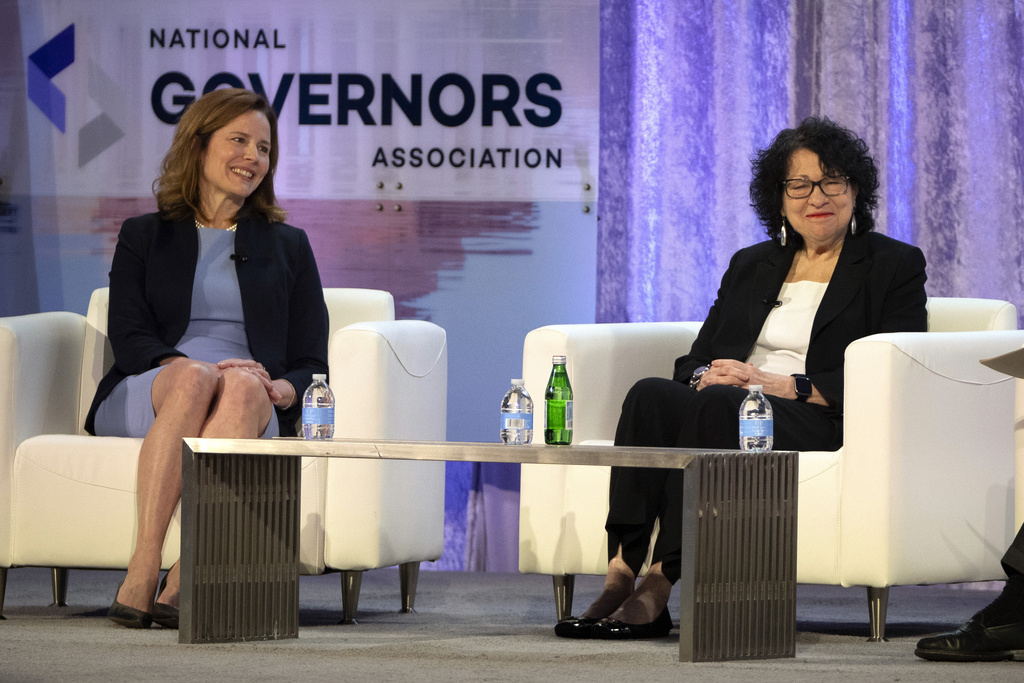
Supreme Court Justices Sonia Sotomayor and Amy Coney Barrett spoke about the inner workings of the high court — and the lessons it can teach everyone else about bipartisanship — in a Friday afternoon panel discussion.
During an hourlong session, the Supreme Court stalwarts were asked to speak on how people can disagree better. The topic is part of a theme of the National Governors Association winter meetings, which are being held at a downtown Washington, D.C., hotel.
Sotomayor, 69, said justices do not speak in person ahead of oral arguments presented to the court so as to preserve their initial thinking before hearing arguments.
“That’s generally been what happens,” she said. “The first time you hear us talking to each other [about a case] is at oral arguments.”
But they do speak in person, and quite frequently, at other times.
Barrett, 52, said the justices have lunch four times a week when the court is in session, and stressed the importance of face time in communicating both at the court and in the wider world.
“One of the worst post-COVID developments that we have is that people spend less time face-to-face,” Barrett said. “I think it’s a lot easier to demonize someone or to resent someone when you’re not interacting with them in flesh and blood on a regular basis.”
She later said she discourages remote work for her clerks for the same reason.
But Barrett acknowledged that taking a bipartisan stance is easier for court justices than for legislators for a number of reasons, including the fact that there’s no need for forced compromise.
“Being on the court is a little different than being in a legislature because you don’t want to compromise,” she said. “I think that Justice Sotomayor would agree with this. We wouldn’t compromise on or, like, sausage-make on what we think the Constitution requires.”
“It wouldn’t work well to have a ‘my way or the highway’ attitude in that process,” Barrett said.
Another major difference between the court and Congress is the total lack of cameras inside the courtroom. Sotomayor argued that the presence of cameras undermines bipartisanship in multiple ways.

“What’s happening, regrettably, in too many legislative processes, is because there are cameras in your chamber, many legislators and others are not sitting in the room anymore,” Sotomayor said. “If you’re not listening, you’re not going to be able to think about what other people are saying.”
Later, Sotomayor said, “I think the worst thing that’s happened to the judiciary is political parties,” which have adopted some of the court’s nuanced terminology to throw around as buzzwords. She even joked that she’s thankful “U.S. presidents don’t last that long,” with the court’s lifetime appointments providing a measure of insulation from political bickering.
Gov. Spencer Cox (R-UT) opened the session by outlining his concerns about slipping bipartisanship.
“Republicans and Democrats increasingly view the other side not just as misguided, but as immoral and dishonest,” he said. “Thirty percent of Americans have ended a family relationship because of politics.”
That concern led him to launch the “Disagree Better” initiative, he said, which now includes a full college course being taught at Colorado State University.
A group of governors in town for the NGA conference met earlier Friday with President Joe Biden, though notably absent were top Republican Govs. Ron DeSantis (R-FL) and Greg Abbott (R-TX), the latter of which is in a legal battle with the Biden administration over immigration.
Cox noted that governors at the White House mingled together with no respect to party affiliation. Furthering this notion, he was joined in the afternoon session by Gov. Jared Polis (D-CO), with whom he launched “Disagree Better.”
“As Arthur Brooks said, almost no one is ever insulted into agreement,” Polis said. “And so again, even on a purely pragmatic basis, if your goal is to move or change the status quo, you’re unlikely to get there by demonizing and attacking your enemies.”
Barrett stressed that notion during the discussion. She still teaches college courses on occasion and tells her students they should feel free to express their views.
“Everyone needs to assume from everyone else the exact kind of good faith that Justice Sotomayor was talking about,” she said.
“If we can’t survive by tolerating differences and learning to compromise, and learning to allow one another to express other views, we’re going to sink,” she said. “We won’t be able to get anything done as a country.”
CLICK HERE TO READ MORE FROM THE WASHINGTON EXAMINER
Sotomayor agreed.
“It is much easier to disagree agreeably,” she said.







